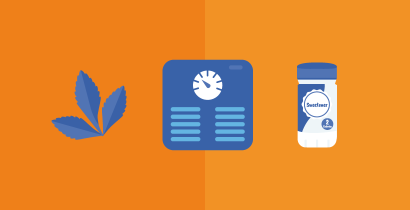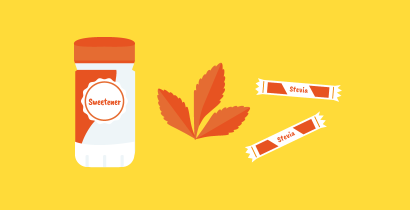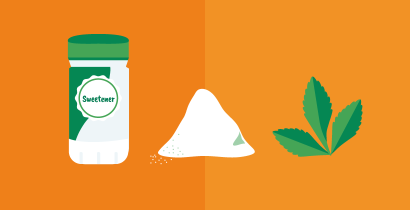Does the sweetener xylitol increase risk of stroke?
Last Updated : 13 June 2024Researchers have published new findings in the European Heart Journal about potential cardiovascular complications associated with the low-calorie sweetener xylitol. Xylitol is a sugar alcohol (polyol) that is commonly used as a replacement for sugar to sweeten foods and beverages such as chewing gums, mints, candies, and flavoured drinks, but can also be found in small quantities in fruits and vegetables. Our bodies also produce xylitol naturally, but in much lower quantities than is found in food and drinks. So, what exactly did this study find? Here are a few things to keep in mind when reading the headlines.
The study behind the headlines
The published paper presents a complex, multifaceted study, but understanding the key steps and how they build on each other is crucial for interpreting the results accurately. The researchers took a stepwise approach, starting with two observational cohort studies, followed by a human consumption experiment and laboratory tests.1
- The researchers first analysed blood samples from 1157 participants undergoing cardiac health evaluations. They found that people with higher levels of a compound they suspected was xylitol had a 63% higher risk of experiencing major adverse cardiovascular events (e.g., a heart attack, stroke or death) over the 3-year follow-up period compared to those with lower levels. However, the researchers couldn't definitively say this compound was xylitol, as the initial assay couldn't differentiate it from other similar compounds.
- To address this uncertainty, the researchers developed more specific procedures for accurately quantifying xylitol levels in blood samples. Applying this to a second group of 2149 people, they confirmed that higher blood xylitol levels were associated with increased risk of both major adverse cardiovascular events and blood clot formation (thrombosis).
- Next, the researchers looked at what happened when people drank a drink containing xylitol. When 10 healthy volunteers consumed 30 grams of xylitol, it led to increased platelet reactivity (e.g. an increased tendency to clot) within 30 minutes. The participants’ xylitol levels rapidly declined back to baseline within 4-6 hours.
- Finally, to try to understand the mechanisms at work in the body, the researchers conducted an in vitro (cell) study using blood samples and an animal study. They found that xylitol enhanced platelet aggregation and adhesion, promoting clot formation. Blood clots can eventually cause a heart attack or stroke because they can stop the blood flowing to a part of the heart muscle or brain and deprive it of oxygen and nutrients. In mice, xylitol also shortened the time for blood clots to form.
Based on this evidence, the researchers concluded that further research is warranted to fully examine the potential cardiovascular safety concerns with xylitol consumption.
What to keep in mind when reading the study’s conclusions?
- In the cohort studies, the participants blood was sampled after they had fasted overnight, so xylitol levels were likely not related to dietary intake.
The half-life of xylitol in the blood, which is the time it takes for half of it to be eliminated from the body, is about 13 minutes. In the human consumption study, levels of xylitol in the blood dropped back to baseline levels within 4-6 hours. Since the blood samples of the participants in the cohort study was taken after overnight fasting, the xylitol in their blood was likely from natural production in the body, not from the food they ate. This suggests that the cardiovascular risks observed in the cohorts were likely associated with endogenous (internally produced) xylitol, rather than dietary intake.
- The cohort studies that found the association between xylitol and increased cardiovascular risk did not collect data on what the participants ate.
The cohort studies did not collect data on dietary intakes of the participants. Many dietary factors influence our cardiovascular risk, like having diets high in sodium, low in fruit, or low in whole grains. Without dietary data, it is challenging to determine if xylitol intake or other dietary habits might have influenced the observed associations between xylitol levels and cardiovascular events.
- The studies that were carried out did not show that xylitol causes an increased cardiovascular risk.
While observational cohort studies cannot prove causation, the researchers complemented this work with a cell and animal study aimed at identifying possible mechanisms by which high levels of xylitol might increase cardiovascular risk. Although combining observational and experimental approaches is a strength of this study, it still does not prove that xylitol causes an increased cardiovascular risk. The experimental studies demonstrated that xylitol promotes clot formation in test tubes and mice. However, it remains unclear whether this eventually leads to cardiovascular events like heart attack or stroke in people who frequently consume high doses of xylitol. We would need more long-term research on xylitol consumption and cardiovascular health to establish this.
- The study population may not be representative of the general population.
The participants in both cohort studies were patients undergoing a cardiac risk assessment and therefore were at high-risk for a cardiovascular event. The findings may not be relevant for the general population as the study participants could have risk factors that differ from the overall population. Furthermore, the human experimental study included only 10 volunteers. A small study sample like this limits the generalisability of the findings
- This study only concerns xylitol and the findings are not relevant for all types of sweeteners.
This specific paper focuses on xylitol only, not other types of sweeteners. Different sweeteners have varying chemical compositions and metabolic effects. Although the paper makes an assumption that other sugar alcohol polyol sweeteners may share similar pathways to thrombosis potential, individual assessment of each sweetener is needed.
What do the authorities say?
- The European Commission has approved xylitol (E967) for use as a sweetener in the European Union in a range of products including jams, marmalades, spreads, chewing gum, and baked goods.2 The European Food Safety Authority (EFSA) is currently reviewing its risk assessment for xylitol in foods to take into account data that has been generated since it was approved.
- EFSA also advises that in the context of a healthy and balanced diet, added and free sugar intake should be as low as possible.3 The World Health Organization advise limiting free sugars to no more than 10% and ideally less than 5% of a person’s daily energy intake.4 Sweeteners may play a role in reducing sugar intake in the diet without having to sacrifice the pleasure of eating sweet foods.
References
- Witkowski et al., (2024) Xylitol is prothrombotic and associated with cardiovascular risk. European Heart Journal, ehae244, https://doi.org/10.1093/eurheartj/ehae244
- Commission Regulation (EU) No 1129/2011 of 11 November 2011 amending Annex II to Regulation EC No 1333/2008 of the European Parliament and of the Council by establishing a Union list of food additives.
- EFSA (2022) Tolerable upper intake level for dietary sugars. EFSA Journal 20(2);e07074.
- World Health Organization. (2015). Guideline: sugars intake for adults and children. World Health Organization.



